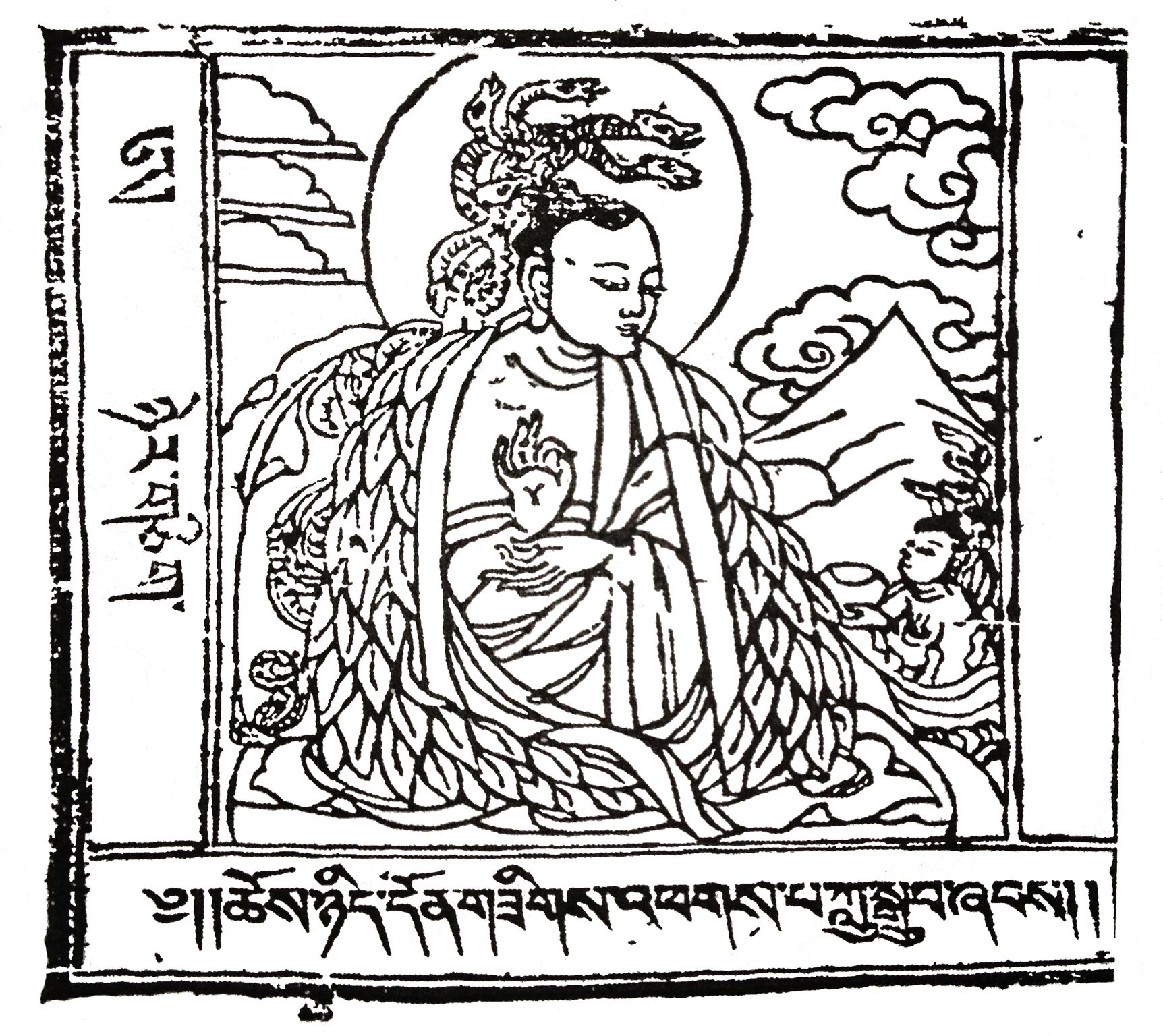Class 20: A Self-Perpetuating Wheel of Pain
[su_icon icon=”icon: link” color=”#ff1259″ size=”20″ shape_size=”12″ url=”https://youtu.be/wrPqQZml0bU?t=7s” target=”blank”]Video[/su_icon]Hi, welcome back to our at-home lam rim (LAM RIM) retreat. Thanks again to Stanley for coming back—you didn’t run away! And we’re on session number 20. And the title of this session is called “A Self-Perpetuating Wheel of Pain.” And the image we’re using is a downward cycle staircase.
The word “self-perpetuating” is very important. I had a watch made recently by a Swiss friend for Veronica. It took him a year to make it, so it’s a very nice watch. I was trying to figure out this winding thing. It took a year, it cost a lot of money, and I called him I said, “it’s not working.” He said, “What’s wrong with it?” I said, “I’m trying to wind it and it’s not working.” He said, “Geshe-la, it’s a self-winding watch.” “What’s a self-winding watch?” He said, “Every time you move, it winds it again. It winds itself.”
And sansara (Saṃsāra), let’s talk about this word “sansara.” First of all, the correct pronunciation is “sansara,” like “S-A-N” not “S-A-M”. You hear a lot of people say “samsara.” And that’s a mistake based on the English letters used to show Sanskrit. But according to the rules of Sanskrit before an “S” an “M” changes to an “N”. So we should say “sansara.” And you know you tell people, “How are you doing today Stanley?” “Samsara is being bad to me. This samsara is really bad. I’m thinking to move to Hawaii.” That’s not sansara, okay, and this world is not sansara. Get used to it. This world is not sansara.
[su_icon icon=”icon: link” color=”#ff1259″ size=”20″ shape_size=”12″ url=”https://youtu.be/wrPqQZml0bU?t=3m40s” target=”blank”]Video[/su_icon]Sansara is a kind of self-winding mechanism. You get trouble, which comes from doing something bad. To get out of the trouble you do something bad, then you get more trouble, and that becomes a cycle. To talk about it in real terms, in the two husbands example, the wife—okay, it could be the husband, but we just use the wife—the wife yells at the kids on Friday. She hears her words, they plant a seed in her mind. Next Wednesday that seed opens when she walks in the kitchen and her husband says, “You’re stupid.” Then automatically she says, “I didn’t say anything and he called me stupid!”

“I didn’t do anything!” How many thousand times have you said these words? “I didn’t do anything, and my wife yelled at me.” I do something, she doesn’t yell at me. Just kidding. Then she yells back. “I just got home! I didn’t say anything! You attacked me, called me stupid.” Then because she doesn’t understand, she gives an answer, “I’m not stupid, you’re stupid.” She hears her own words, they plant a seed in her mind. The next week that seed opens in the kids’ bedroom, the kids are bad. She says, “I didn’t do anything. The kids are bad.”
And then that is a sansara. It’s one self-winding watch, and you have thousands going on at the same time. You can even yell at somebody in your office at work and that seed will open at home, 20 miles away, and your husband will yell at you. “Oh, Geshe-la, I didn’t know I can make a bad seed at work. It will open in my kitchen at home?” Yes. “Why?” You brought the bad seed in the suitcase [in your mind] from home. You brought it home and it opened there.
[su_icon icon=”icon: link” color=”#ff1259″ size=”20″ shape_size=”12″ url=”https://youtu.be/wrPqQZml0bU?t=7m01s” target=”blank”]Video[/su_icon]So in this session, number 20, we’re going talk about the idea that sansara tends to create more sansara. Let’s go to the text. tendrel di dak nga-ma nga-ma le, chi-ma chi-ma kye ne (RTEN ‘BREL ‘DI DAG SNGA MA SNGA MA LAS, PHYI MA PHYI MA BSKYED NAS). So, sets of cause and effect—earlier sets of cause and effect—can also trigger later sets of cause and effect. kyewa ga shi sok dukngel tamche kormor nyongwa yin (SKYE BA RGA SHI SOGS SDUG BSNGAL THAMS CAD ‘KHOR MOR MYONG BA YIN). Therefore, it tends to repeat itself. Reborn. Get old. Die. During the reborn you did more seeds, kormor (‘KHOR MOR) means it “happens in cycles”—big sansaras that take three lifetimes, and little sansaras with your kids and your husband that take three days.
le chik gi drebuy tendrel gyi yun la (LAS GCIG GI ‘BRAS BU’I RTEN ‘BREL GYI YUN LA) Now, she yells at her kids on Friday. And then on Wednesday when she comes home, that seed opens and her husband yells at her. During the yelling by the husband, which is a result of a seed opening, she’s getting upset and new seeds are being planted at the same five minutes that the old seeds are opening. At the end of one mini-sansara, three, four, five more sansaras are being triggered. So it’s very important to think about that.
Listen! Buddhism says every cause is also a result. And every result is also a cause for something else. And in the Abhidharma, they struggled to find some cause which is not a result or some result which is not a cause. They like to say the last moment before you be reached Nirvana. That’s a result, but it’s not a cause because they believe you disappear when you reach nirvana. But that’s a famous example of a result which is not a cause. But it’s a wrong example. So while she’s getting yelled at by the husband, at the same moment she’s making new causes.
kye shing, ga shi kyewa le jungwa ne (SKYE ZHING, RGA SHI SKYE BA LAS ‘BYUNG BA NAS). Aging and death continue to happen from rebirth, and then misunderstanding your life is continuing to make seeds. Therefore, chik gi chik drang ne korway korlo korway tsawa ni marikpa nyi yin (GCIG GIS GCIG DRANGS NAS ‘KHOR BA’I ‘KHOR LO ‘KHOR BA’I RTZA BA NI MA RIG PA NYID YIN). So if we dig, dig, dig, and find the single cause of all of them, marikpa nyi (MA RIG PA NYID). marikpa (MA RIG PA) means “misunderstanding,” and nyi (NYID) means “just that one thing.”
[su_icon icon=”icon: link” color=”#ff1259″ size=”20″ shape_size=”12″ url=”https://youtu.be/wrPqQZml0bU?t=11m53s” target=”blank”]Video[/su_icon]Now, you know, I’ve been studying Buddhism for fifty years or something. Hard. I mean, many hours a day. These ideas, just that example in the kitchen, that’s all you need. Let’s say there’s a geshe in the monastery, studied thirty, forty, fifty years. They studied all the “jing,” all the sutras, and they know all the philosophy, they know all the schools. Or there’s one woman working for some company, and she comes home and her husband says,” you’re stupid,” and immediately she thinks “Oh, that’s happening because I planted a seed when I yelled at my kids last week.” That one idea, in one woman’s mind in one kitchen—she just understood all the sutras about dependent origination, and there’s nothing more than that.
And if you ask her, “that husband yelling at you, did he decide to yell at you? Is that why you’re getting yelled at?” If that woman says, “No, no, no, no. No, not like that. He’s coming from me.” “No, but I see some husband yelling at you, who doesn’t come from you.” Then if she says “No, no, that one doesn’t exist. It was always a wrong idea. I thought he decided to yell at me, but now I understand he is just coming from me. I used to think there was a husband in the kitchen who, just before I got home, decided to yell at me. But then I understood dependent origination and I understood he comes from me yelling at my kids last week. And there’s only that one husband in my kitchen. Only one, who comes from me”
[su_icon icon=”icon: link” color=”#ff1259″ size=”20″ shape_size=”12″ url=”https://youtu.be/wrPqQZml0bU?t=15m20s” target=”blank”]Video[/su_icon]What percent of their husband comes from you? 100.000 percent of that husband comes from me. Therefore, there’s no other husband in the kitchen who decided to yell at me just before I got home. That woman who says that husband is 100.000 percent coming from me, she understands dependent origination, and when she goes like this … and there’s no other husband in the kitchen, she just saw emptiness. And she’s a master of dependent origination, and she is a master of emptiness. Better than a geshe in the monastery who spent forty years studying dependent origination sutras and emptiness sutras who doesn’t understand the husband.
So, I think it’s important to learn all of the backup material, but that doesn’t make you a master. Master of emptiness. Master of dependent origination. Any normal person who understands why their wife or their husband is yelling at them, and who understands there’s no other husband or wife, they are a master of dependent origination. They are a master of emptiness, and they have mastered the teaching of the Buddha, all of it. Let’s get back to the book.
[su_icon icon=”icon: link” color=”#ff1259″ size=”20″ shape_size=”12″ url=”https://youtu.be/wrPqQZml0bU?t=17m57s” target=”blank”]Video[/su_icon]
We saw many, many wheels affecting … like inside a watch. And we have that image, I’m going to show it to you again. These different cogs, interacting gears. I have a crush. I have a crush on Tsongkapa, I have a crush on my lama. Nowadays, I especially have a crush on Arya Nagarjuna. And here’s my favorite picture of Nagarjuna. I really like it. I don’t know, he just looks really cool. We are translating some of Nagarjuna’s works in our Mixed Nuts translation group. The director of the Mixed Nuts translator group, Nick Lashaw, he’s translating one of Nagarjuna’s most difficult works, called the “Sixty Verses.” And it’s basically a long essay, in poetry, about emptiness. So again, you’re very welcome to go look at these books. What’s it called? Diamondcutterclassics.com. You can go read his commentary/translation for free. And at the YouTube Tibetan Language channel, there’s hundreds of classes about Nagarjuna. So you should go see them.

Here, our author Pabongka Rinpoche quotes Arya Nagarjuna, and as usual it’s poetry.
sumpo dak le nyi jung te,
nyi le dun jung dun le kyang,
sum jung sipay korlo de,
nyi ni yang dang yang du kor
(,GSUM PO DAG LAS GNYIS ‘BYUNG STE,
,GNYIS LAS BDUN ‘BYUNG BDUN LAS KYANG;
;GSUM ‘BYUNG SRID PA’I ‘KHOR LO DE,
,NYID NI YANG DANG YANG DU ‘KHOR,)
Two come from the three.
Seven come from the two.
And from the seven, again three.
It’s a wheel of pain, and nothing more,
and it circles, and it circles, and it circles.
Okay, now he has a commentary. nyon mong sum (NYON MONGS GSUM) means “three of the links are negative emotions.” These are one, eight, and nine. Number one is misunderstanding your husband. Number eight, the simple way you can say it is: “Are you sorry you yelled at your husband?” And you say, “No.” And number nine is like: “Does the husband come from you or from him?” “Oh, I thought about it and I think he comes from him.” So those are three negative emotions. They produce two. What’s “two”? “Two” means two kinds of karma. Link number two and link number ten. Link number two is fresh karma, like the watermelon seed you just put under the ground. And link number ten is the watermelon seed that got the water and got the fertilizer and it’s nice and fat and it’s going to open soon. We’ve been talking about how to group the twelve into groups. Now we have Nagarjuna’s grouping.
[su_icon icon=”icon: link” color=”#ff1259″ size=”20″ shape_size=”12″ url=”https://youtu.be/wrPqQZml0bU?t=23m20s” target=”blank”]Video[/su_icon]And by the way, Nagarjuna wrote an incredible tiny book, one or two pages, about the twelve links. It’s called Pratitya Samutpada Hirdaya Karika (Pratītya samutpāda hṝdaya kārika), which means “Verses about the Very Heart of Dependent Origination.” He said let’s group it this way. In the twelve links, three of them are negative emotions. Number one, misunderstanding. Number eight—like light and … how do you say it? We can say “being happy about your bad seeds.” And then number nine, totally not understanding those bad seeds and giving them more fertilizer.
So in Nagarjuna’s way of grouping the twelve, three of them are negative emotions. What’s your second group Nagarjuna? “Oh, that’s the two of them belong together because they’re karma.” There’s the skinny seed that you first put under the ground—”I’m not stupid, you’re stupid”—and then there’s the big fat seed that’s ready to produce some bad result for you. For example, next week your kids will not behave. Then, one of the things I love about Nagarjuna the most, he understood what Miles Davis said. Miles Davis is the greatest jazz player of all time, maybe. And his most famous quotation about jazz: “Less is more.” So it’s not how many notes you can play, it’s about what notes do you leave out, and the other notes become more powerful. And Nagarjuna is unbelievable at giving less which becomes more.
“Hey Nagarjuna, we had all these groups, twelve, you only have two so far.” Three of the twelve links are negative emotions. Two of the twelve links are karma. “What about the other seven? “Huh? Other seven? I got one word: pain.” So, he’s like this … three are negative emotions, two are karma, seven are—he says a bad word—seven are just pain. Let’s review what those seven are.
[su_icon icon=”icon: link” color=”#ff1259″ size=”20″ shape_size=”12″ url=”https://youtu.be/wrPqQZml0bU?t=27m04s” target=”blank”]Video[/su_icon]Link number three—your mind going into your mom.
Link number four—your body and mind inside your mom.
Link number five—your sense organs growing.
Link number six—they make contact with the outside world, and the inside world.
Link number eleven—getting born in this kind of place.
Link number twelve—getting old and dying in this way.
So then I kind of see it as a conversation. I think Nagarjuna is in a Starbucks, he’s just drinking coffee and talking with his friend, and his friends is like, “Yeah, so you covered all twelve.” Three negative emotions, two karma, and seven complete poop in your life. And his friend is like, “Yeah Nagarjuna—[sips coffee]—you got anything else to say?” “Yeah, I’ll tell you something really bad. The seven poop links cause the three negative emotion links, again!”

So now Nagarjuna took us to a new place, and it’s so short you almost miss how significant it is. Yeah, three negative feelings, they make you make karma. Then if you make karma, you get this body and mind, and suffer, suffer, suffer. Oh, and suffer, suffer, suffer—they make another set of three bad thoughts. And those make another two karmas, and those make another seven, and they make another three, and they make another two, and they make another seven.
jungwa sok ngar shin korwe sipay korlo gyun mi chepar kor (‘BYUNG BA SOGS SNGAR BZHIN ‘KHOR BAS SRID PA’I ‘KHOR LO RGYUN MI ‘CHAD PAR ‘KHOR)—therefore, it is a self perpetuating wheel. And it has been turning for time with no beginning without a single break. And as long as those twelve links circle, we will have pain. Okay, that’s the very cheerful session number 20.
Thanks again to Stanley for translating and we’ll see you tomorrow at session 21, which is called “Seeing that the Jail is a Jail.
See you tomorrow.








